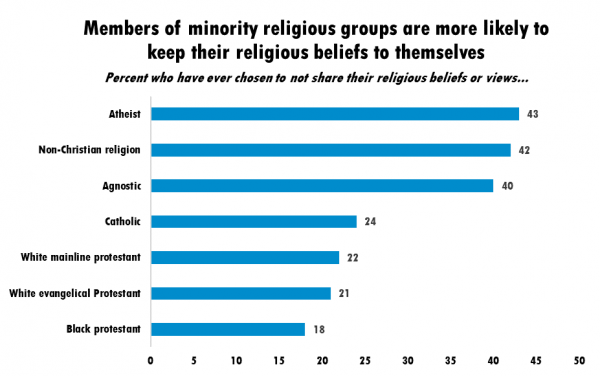
For many Americans, religion is a fundamental part of who they are. It is a key facet of their identity; informing their interactions, relationships, and opinions. But for many other Americans, including a significant number of those who belong to minority religious groups, sharing religious beliefs with others is not as easy. The latest American Perspectives Survey finds that 27 percent of Americans report that they have not shared their religious beliefs or views about religion because they feared the disapproval of friends or family members. Americans who are most likely to shield their religious beliefs or views about religion from those around them are disproportionately members of religious minority groups. Atheists, agnostics, and people who belong to non-Christian religious traditions are more likely than Christians to keep their religious identities and beliefs to themselves. 42 percent of Americans who belong to a major non-Christian religious tradition say they have at one time chosen not to share their beliefs because they thought their friends or family members might disapprove. 43 percent of atheists and 40 percent of self-identified agnostics say they have done the same. In contrast, less than one-quarter of Catholics (24 percent), white mainline Protestants (22 percent), white evangelical Protestants (21 percent), and black Protestants (18 percent) have reported doing this.

There is a significant age division among white evangelical
Christians in the likelihood of hiding their religious beliefs from those they
know. One third (33 percent) of younger white evangelical Christians (age 18 to
39) report having not shared their religious beliefs with friends or family
members, more than twice the number of white evangelical Christians age 60 or
older who give that response (16 percent).
Sharing Religion in a
Diverse Social Context
Americans who have more religiously diverse social networks
are more likely to keep their views on religion to themselves. Thirty-eight
percent of Americans who have a religiously diverse social network have ever
kept their religious beliefs to themselves because they thought their friends
or family might disapprove, compared to 26 percent of those who have less religiously
diverse networks.[i]
Americans whose current religious identity differs from how
they were raised are more likely to avoid discussing their beliefs with friends
or family than those whose religious identity has remained the same (37 percent
to 23 percent). This is particularly prevalent among atheists who were raised
religiously, 52 percent of whom report that they have chosen not to share their
beliefs or views on religion at some point.
Americans who have a close friend or family member who is
gay or lesbian are also more likely to keep their religious beliefs from their
friends and family members than those who do not (30 percent vs. 22 percent).
This is even more true of younger Americans. More than four in 10 (42 percent)
younger Americans (age 18 to 34) with gay or lesbian friends report having not
shared their religious beliefs with others.
Religious Doubting
& Sharing Religious Beliefs
In general, Americans who express more certainty in their religious beliefs are less inclined to hide them from others. Only 21 percent of Americans who believe in God and feel certain in their belief report that they have ever not shared their religious beliefs with friends or family members. Uncertain believers are more likely to hide their religious views. Nearly one-third (31 percent) of Americans who sometimes doubt their belief in God have chosen not to share their views with friends or family members at some point. Uncertain nonbelievers are the most likely to shy away from openly discussing their religious beliefs. Of those who report that they do not believe in God but entertain doubts about their views, 42 percent say they have at times refused to share their religious beliefs with friends or family members. In comparison, 32 percent of people who do not believe in God and never doubt their disbelief report having chosen not to share their views on religion at some point.
[i] Religiously diverse social network is defined as having close friends or family members in all of the following religious identity groups: Atheists, Muslims, Catholics, and evangelical Christians.
The post Hidden identity: When Americans decide to keep their religious background to themselves appeared first on American Enterprise Institute – AEI.
